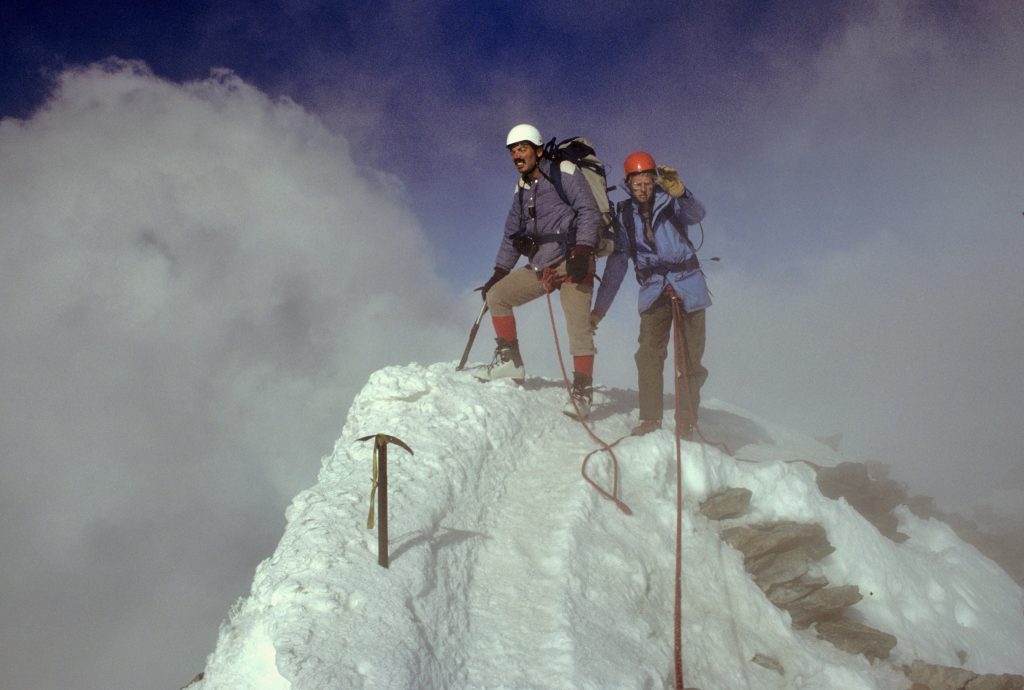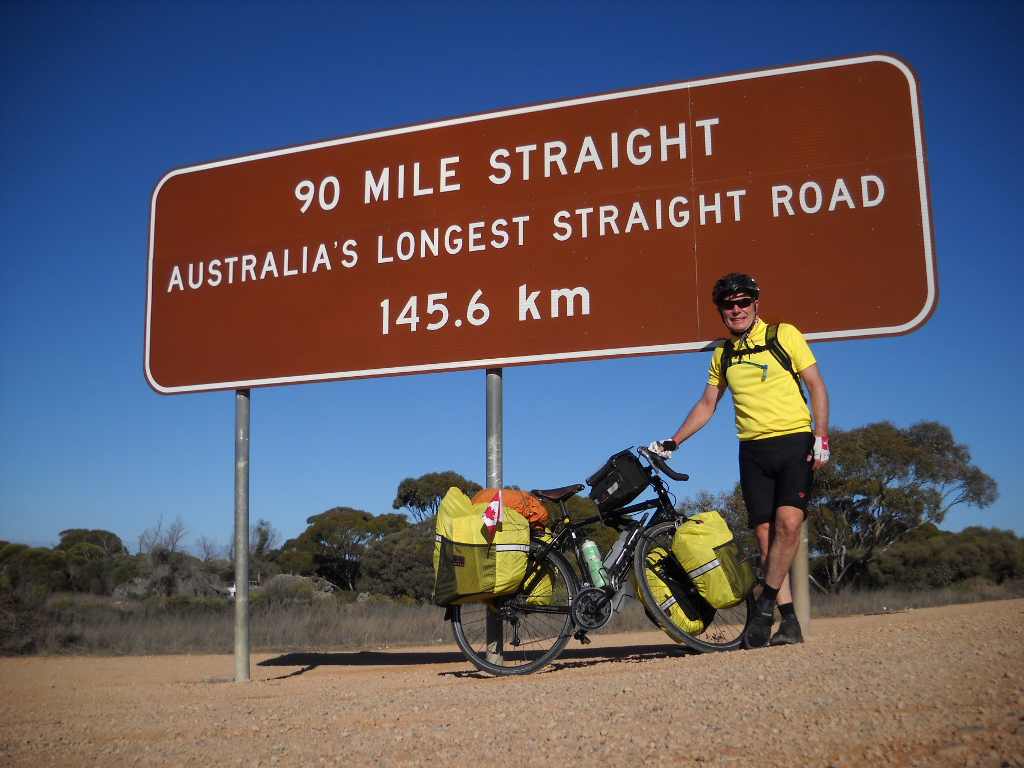ELORA – It’s been said many times by many parents: “When I was young, I’d walk five miles to school in the snow, uphill both ways.”
For Ian Evans, it was only one way, but the destination was the South Pole – entirely uphill to an elevation of nearly 10,000 feet.
At more than 1,200 kilometres from the nearest coastline of Antarctica, it is one of the most remote and harsh environments on the planet, and the highest continent on earth, sitting atop an ice sheet nearly two miles thick.
Evans, now 67 has had a thirst for exploration and has embraced adventure all his life.
His first peak was conquered at the tender age of three, having navigated his way to the roof of the family shed. Since then, he’s climbed five of the “Seven Summits” excluding Mount Everest and Vinson Massif.
He has run ten marathons and cycled tens of thousands of kilometers including trips across Canada from the Atlantic to the Pacific, around the coastline of Iceland, along the length of the UK, and across the Australian outback from coast to coast – twice.
Suffice it to say, Evans is an adventurer.
“Be yourself; everyone else is already taken.” – Oscar Wilde
With a rural background in England, Evans is self-described as ‘an ordinary guy’ who pushed himself to achieve extraordinary things.
He’s not a world-class athlete, holds no world records, but is a chartered accountant who has led a regular life in many ways.
“I had very interesting teenage years and early twenties, but I eventually found a job in an accountant’s office. I was good at it, and I went crazy studying,” Evans said.
He has become a passionate speaker, sharing the lessons he’s learned both in business and through his adventures with audiences around the world.
He speaks at corporate keynote events as well as to students in Canada and abroad.
The turning point that led Evans to take climbing seriously was his expedition to the peak of Mount Kilimanjaro in Tanzania – the highest peak in Africa.
At 27, he was working for Price Waterhouse Cooper in Zambia when a friend he was sharing a house with asked him to go.
“I found that I really loved the altitude, the impact it had on my body and the challenge of getting through the logistics of it. I thought, ‘this is something I can do’, so I had a dual life for 10 or 15 years.
“I pursued my financial career vigorously, but also pursued climbing the highest peak in every continent,” he said.
The five-day climb wasn’t especially technical, but the altitude and lack of water were among the biggest complications.
“It was crazy the way we did it on the cheap, hiring some guides at basecamp. It was very inexpensive and rustic, which was a lot of fun,” Evans said.

Evans (left) at the summit of the Matterhorn. Submitted Photo
“Adventure is just bad planning.” – Roald Amundsen
Evans later travelled to Europe for training courses in the Alps where he learned the technical side of climbing and summited the Matterhorn in Switzerland.
“I just kept on getting better at it and doing more extreme things. In the end, on the highest peak in Russia, I fell 300 feet and nearly killed myself,” he said.
Despite his gear being badly damaged, Evans was not one to give up easily – or at all. He borrowed some gear and made it to the summit the next day.
“That shook me up sufficiently and I kind of thought, by the end of this, it’s probably going to end badly.”
He decided to move on from climbing at high altitudes, but continued to seek out new adventures.
When asked which of his many undertakings was most rewarding, Evans said “the best expedition I’ve ever been on is the next one.”
“In terms of a seminal experience, for me, Antarctica clearly encompassed everything I did. It was the culmination of my other skills and other expeditions that gave me the toolkit that enabled me to reach the South Pole.”
The frozen expanse of Antarctica proved to be an intense test of Evans’ physical and mental endurance. Battling biting winds and sub-zero temperatures, he proved that age is no barrier to achieving remarkable feats.
His colleagues on the expedition tried to persuade him to climb Vinson Massif, which was a ten-minute flight from basecamp.
“I was so close to the peak, but I’d lost the drive for that, so I turned it down. I thought, ‘I’m okay with that.’”
Unbeknownst to Evans, he had plantar fasciitis when he arrived – inflammation of the fibrous tissue along the bottom of the foot. He became aware of the problem about a third of the way into the trip.
“The worst thing you could possibly do is drag a sled in the South Pole,” he said.
“You’re leveraging the bottom of your foot every step. That was the most extreme point of mind over matter because I had more than 700 kilometres to go, and I had no idea how I was going to take the next step.”
“Never, never, never give up.” – Winston Churchill
Determined to finish, Evans had to find a way to press on. The four-man team was equipped with satellite phones, so being air lifted out was just a call away.
“It was bad to start with, but it got really horrendous. I had to figure it out and knew what I couldn’t do. I couldn’t keep up with the other guys,” he recalled.
“There were two or three solutions I came up with. When we started skiing in the morning, I wouldn’t listen to music, I wouldn’t think of anything. I would just start walking and let my mind go everywhere.”
Evans knew he couldn’t possibly ski for nine hours in his condition, so he focused on what he could do.
“I could ski for an hour. I could,” he told himself.
With each milestone, Evans broke the trek into hour-long segments, looking forward to the next Cliff bar or hot drink. Hour by hour, he was able to tackle the expedition, telling himself that it wasn’t a life sentence. It was psychological, and as long as he kept putting one foot in front of the other, he knew the finish line would eventually arrive.
One piece of advice he shared is to “get right to the end of your comfort zone to where you’re just okay… and then take another step.”
Following his own advice, Evans soldiered on. He was often behind, but his three companions were always within visual contact, whether that meant two miles apart on a clear day, or two feet apart in a blizzard.
Somewhat surprisingly, their phone service was excellent and he would call his wife Liz regularly.
“I always had four or five bars of service, so we would speak quite a bit.”
Most of Evans’ gear was custom made, something Liz helped with immensely.
“I couldn’t possibly have done this without her, which is a bit cliché, but it’s so true. She encouraged me to go to Antarctica and helped me find solutions,” he said.
“You can’t use a Gore-Tex jacket down there, because the fine ice crystals will clog it up. The jacket I had was cotton, which is lightweight and breathes well.”
One of the things the team agreed on early on was that there would be ‘no whinging’ – no matter how bad things got. Any complaints were met promptly with push-ups to keep everyone in line and spirits up.
“Adversity is not improved by advertisement,” Evans said.
Despite the odds, the team eventually made it to the South Pole station with Evans having lost 25 pounds from start to finish.
“Navigating can be difficult, but the real challenge for me wasn’t in Antarctica at all,” he said.
“Once I was home I realized I had a serious case of PTSD. Not from bullets and guns, but I was a changed person for many months – it was an inability to deal with issues and to meet people.”

Evans poses at the South Pole after completing his expedition. Submitted photo
“You can’t think of the summit when you’re at basecamp.” – Ian Evans
Beyond traversing the Antarctic, Evans was also videographer and photographer for his documentary “Lunatic”, which ended up being screened in 12 film festivals and winning seven awards.
The crowning feature was being accepted into the Kendal Mountain Festival in the UK – one of the top adventure film festivals in the world.
“I used pictures from the other guys too, but I was essentially the documentary guy.
“Kent Allison from Goad Media Group was the producer of the film, and he did a fantastic job,” Evans said.
As a result of the film’s success, Evans founded the Elora Adventure Film Festival, which debuted in the fall of 2023.
In line with his mantra of tackling challenges one small step at a time, he hopes to grow the festival over the coming years.
A big believer in giving back, Evans has raised money for the Center Wellington Community Foundation, the Centre Wellington Food Bank, and the Jack R. MacDonald Community Foundation.
“That’s too coincidental to be a coincidence.” – Yogi Berra
Through his many travels, Evans has had many extraordinary encounters, some more unbelievable than others.
While cycling through the desert on his way from Perth to Sydney, Australia, Evans had pulled over to the side of the road to set up camp.
“I pulled off for a rest one day and this guy comes up with a car pulling this big boat down the road.”
The two started talking and after explaining that he was biking to Sydney, the man laughed and said that what Evans was doing was insane.
“You’re dragging a boat across a desert 2,000 kilometres from the nearest water, what are you doing?” Evans fired back.
They had a laugh before talking about where they were from.
“He said he was from Brisbane and I told him I was from Canada.”
After a bit of back and forth, Evans ended up saying “I’m from a little village you’ve never heard of called Elora.”
“I was there two weeks ago!” the man exclaimed. “I’ve got friends, Terry and Jerry who live in Elora.”
If Terry and Jerry from Elora sound familiar, it may be because they were featured in last month’s edition of Senior Spotlight in the Advertiser.
As Evans continues to push the boundaries of what’s possible, his story serves as a testament to the enduring spirit of exploration.
Whether trekking through icy deserts, scaling towering summits, or pedaling across continents, his conquests are a reminder to never underestimate the power of the human spirit.

Evans cycling across the Australian outback. Submitted Photo
For more information about Evans or to learn more about the Elora Adventure Film Festival, visit ianevans.ca or eloraadventurefilmfestival.ca.




